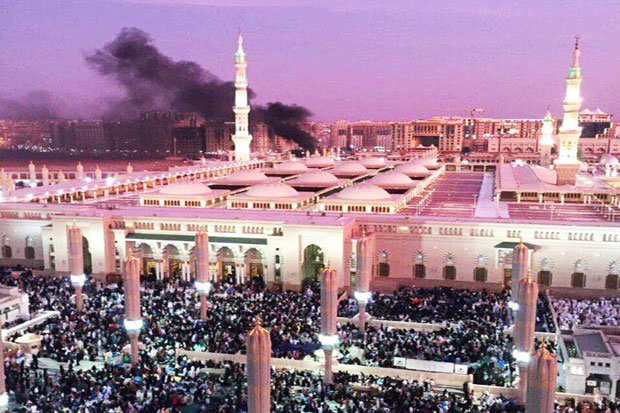
© SPAClouds of smoke from the bomb blast in Medina, Saudi Arabia /
On Monday, July 5, suicide bombers blew themselves up in Qatif and Medina, several hours after Saudi security officers foiled an attack near the US Consulate in Jeddah. In Medina, a bomb exploded in the vicinity of a police post outside the Prophet's Mosque, killing four policemen and two civilians. In Qatif, two suicide bombers blew themselves up outside a Shiite Mosque. No casualties were reported.
The suicide attacks are specially alarming as they underline various basic and important points:
Attacking a Shiite mosque, a US entity, and a holy city are meant to embarrass the House of Saud.
The attack on a Shiite mosque was meant to fuel sectarian violence, while the one in Medina specifically undercuts the Saudi family's claim to be the "custodians" or "protectors" of the two holy places - Mecca and Medina. The suicide attack couldn't be more counterproductive because it took place at a revered Muslim location during Ramadan, meaning the suicide bombers' religion is terrorism. That says why Iran, despite its political differences with Riyadh, was among the first to strongly condemn and respond to the attacks with outrage and horror.
Many aren't surprised that Saudi Arabia is now under attack, where even the holy sites are at the top of the target list for suicide bombers.
The regime has a lot of explaining to do with regard to its "well-established" and "well-documented" links to ISIL and Al-Qaeda.
The implication is that foreign terrorists also played a significant role in the attacks. Interior Ministry Spokesman Mansour Al-Turki says the suicide bomber who blew himself up near the US Consulate was an expatriate from the United Kingdom.
This has a practical and psychological aspect. The attacks could have been a pointed warning to Riyadh to avoid retreat in the Yemen war, or still increase support for the proxy forces in Syria and Iraq. It could be to say to Riyadh, 'if we lose the wars, we are coming home.' More so, the Saudi-led war on Yemen and its unconditional support for various terror outfits in Iraq and Syria has divided the regime even more. This can be isolating.
It's still difficult to speculate about the terrorist group's reasoning -
no one has claimed responsibility, while previous mosque attacks have been claimed by ISIL militants. However, it may be a matter of where they had the greatest opportunity - after their operatives were detained in Iran nearly two weeks earlier before they could hit any target.
For the terrorists, the aim is to show they can still terrorize, mobilize, and polarize with violence, even though they are losing across multiple fronts throughout the region. This is not so much about revenge, but simply demonstrating a continued capability. They may be down but, they are saying, they are not out.
Saudi Arabia is a more fruitful recruiting ground for ISIL and Al-Qaeda than any other place in the region. Here, Wahhabism is an incubator for terrorism and sectarianism. The place has all kinds of terrorists and its cities are dominated by immigrants, narrow-minded religious leaders, and extremist schools of thought. Despite the global vision of the extremist ideologues and the portrayal of ISIL and Al-Qaeda as international, such activism is fundamentally local.
Anything is possible, but the complexity of the attacks and the methods they used suggest that it's not merely inspiration or activating a local cell. It suggests that at least some of the suicide bombers had training in a theater of war or in a territory controlled by Al-Qaeda and ISIL.
Almost the entire range of extremist and terrorist groups are supported by Saudi Arabia and Turkey, with their key commanders and leaders being Saudi nationals. ISIL, Al-Nusra and other extremist groups pursue the same line of ideology exercised and promoted by Saudi Arabia, Wahhabism. Hundreds of Saudi clerics are among the ranks of ISIL and Al-Nusra to mentor the militants.
Wahhabism is now the only source of the textbooks taught at schools in the self-declared capital of the ISIL terrorist group, Raqqa, in Northeastern Syria resembling the texts and lessons taught to schoolgoers in Saudi Arabia. The Wahhabi ideology, an extremist version of Sunni Islam that is promoted almost only in Saudi Arabia, sees all other faiths - from other interpretations of Sunni Islam to Shiism, Christianity and Judaism - as blasphemy, meaning that their followers should be decapitated as nonbelievers.The blowback from the Saudi-led and Saudi-backed wars on Syria and Yemen is real. The Kingdom is now a big target for "returnees" and this is the shape of even greater things to come. The terrorist groups have a lot of Saudi fighters in their ranks. They are worried that the Saudi monarchy might be thinking of compromising them in return for concessions from the West as recent disputes and widening rifts between the Saudi royalty and some Wahhabist ideologues suggest. Official Riyadh and Wahhabist ideologists have been in tight power rivalry for the past several years.
The final point in all this is that those behind the Monday attacks were deeply embedded in broader communities and looked after by dozens, if not scores, of Saudi religious leaders and schools of thought, which share their extremist views. The home-grown terror outfits have begun to mobilize, terrorize and polarize, knowing that there is still a country for their extremist views in Saudi Arabia. This is the reality of contemporary Wahhabism in Saudi Arabia.
Reader Comments
to our Newsletter